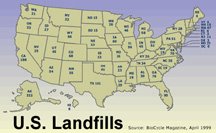Court rules for local governments in fight over garbage
By Mark Sherman
The Associated Press
WASHINGTON, DC - The Supreme Court ruled Monday that local governments can compel private trash haulers to use municipal facilities, even if it would cost more to keep garbage at home than to dispose of it elsewhere.
The ruling upholding local ordinances in upstate New York protects a stream of money that allows the counties, like other governments that have built recycling centers and landfills, to help pay off millions of dollars in debt they incurred to establish such facilities.
The trash companies had argued that the counties violated constitutional protections for interstate commerce. The companies said they would pay much less to send the garbage to out-of-state transfer stations where it is sorted and baled before being shipped off for permanent disposal.
But the court, in a 6-3 decision, said the Oneida-Herkimer Solid Waste Management Authority treats "in-state private business interests exactly the same as out-of-state ones," avoiding any constitutional problems.
"It bears mentioning that the most palpable harm imposed by the ordinances, more expensive trash removal is likely to fall upon the very people who voted for the law," Chief Justice John Roberts wrote for the court.
The justices decided a similar case in 1994, ruling 6-3 that local governments unlawfully restricted interstate commerce by requiring that garbage be sent to a designated transfer facility.
In that case, the facility was privately owned. The case the court decided Monday involves government-owned transfer stations.
Justices Samuel Alito, Anthony Kennedy and John Paul Stevens dissented, saying the cases were substantially similar.
The counties also run a landfill, a recycling center, a compost facility and a hazardous waste disposal station. Only the pickup of garbage is done by private companies.
The authority charges $72.15 a ton for solid waste. The trash haulers say they could dispose of the garbage they collect in the two counties for $37 to $55 a ton.
Twenty-six states and 25 other local governments and trash authorities sided with the counties.
The case is United Haulers Association v. Oneida-Herkimer Solid Waste Management Authority, 05-1345.
The Associated Press
WASHINGTON, DC - The Supreme Court ruled Monday that local governments can compel private trash haulers to use municipal facilities, even if it would cost more to keep garbage at home than to dispose of it elsewhere.
The ruling upholding local ordinances in upstate New York protects a stream of money that allows the counties, like other governments that have built recycling centers and landfills, to help pay off millions of dollars in debt they incurred to establish such facilities.
The trash companies had argued that the counties violated constitutional protections for interstate commerce. The companies said they would pay much less to send the garbage to out-of-state transfer stations where it is sorted and baled before being shipped off for permanent disposal.
But the court, in a 6-3 decision, said the Oneida-Herkimer Solid Waste Management Authority treats "in-state private business interests exactly the same as out-of-state ones," avoiding any constitutional problems.
"It bears mentioning that the most palpable harm imposed by the ordinances, more expensive trash removal is likely to fall upon the very people who voted for the law," Chief Justice John Roberts wrote for the court.
The justices decided a similar case in 1994, ruling 6-3 that local governments unlawfully restricted interstate commerce by requiring that garbage be sent to a designated transfer facility.
In that case, the facility was privately owned. The case the court decided Monday involves government-owned transfer stations.
Justices Samuel Alito, Anthony Kennedy and John Paul Stevens dissented, saying the cases were substantially similar.
The counties also run a landfill, a recycling center, a compost facility and a hazardous waste disposal station. Only the pickup of garbage is done by private companies.
The authority charges $72.15 a ton for solid waste. The trash haulers say they could dispose of the garbage they collect in the two counties for $37 to $55 a ton.
Twenty-six states and 25 other local governments and trash authorities sided with the counties.
The case is United Haulers Association v. Oneida-Herkimer Solid Waste Management Authority, 05-1345.














<< Home